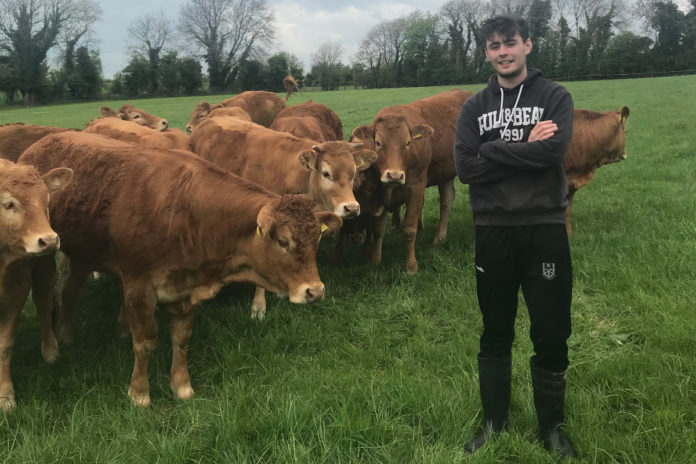21-year-old Finbarr Brennan is a third-year student-teacher with an unrivalled passion for breeding high-end Limousin cattle.
The full-time Dublin City University (DCU) student farms alongside his father, Anthony, and younger brother, Aodhán, in Tullycorbet, on the outskirts of Ballybay in County Monaghan.
Kilnamaddy Limousins is home to 40 breeding females and their offspring on 100-acres of good-quality pasture.
Anthony began farming this particular block of land in 1990 after inheriting the farm from his uncle. The farm has progressed with a shift from conventional-type suckler cows to a more specialised enterprise of pedigree sucklers.
“Farming has been a tradition in the family for over five generations. Both my mother and father come from farming backgrounds.” Finbarr told Catherina Cunnane, editor of That’s Farming.
“My vision for the farm is to produce top-quality grass-fed cattle, forever staying true to the key Limousin traits of fertility, good maternal ability and sustainability.”
“Limousin makes for the perfect beef breed in my eyes. The breeding Limousin female has good functionality, docility, fertility and maternal ability.

Striving for a 365-day calving interval
100% A.I is used on cows with semen sourced from Ireland, the UK and France. The family changed to 50:50 split spring-autumn calving system over five years ago to spread labour requirements more evenly, due to Finbarr’s studies and Anthony’s full-time occupation as an engineer.
“Ultimately, I strive for a 365-day calving interval. Generally, cows and heifers are serviced on their second heat post-calving as research suggests that conception rates are 30% lower on the first heat.”
A vasectomised bull runs with the herd during the breeding season as a means of heat detection. “His role in the breeding cycle cannot be underestimated.”
“He has a chin ball and harness and paints the back of the cycling female as he mounts, thus, informing me of the cycle.” explained the Irish Limousin Cattle Society and North East Limousin Club member.
The Brennans, who operate a closed herd policy, sell the majority of their cattle privately from the farm, while other animals go under the hammer at society sales.
Some heifers are retained as replacements and calve down at 24-months, while others are sold in-calf to pedigree herds. All breeding bulls are kept to 20-22-months and are sold privately.
“We pride ourselves on providing breeding stock for each and every one of our customers based on their specific needs and wants.”
“We operate a strict culling policy where cows, who have traits such as poor milking ability, poor fertility, poor docility or poor functionality, are culled.”

Ag shows
Finbarr began exhibiting cattle at agricultural shows three years ago and makes his presence felt in Castleblaney, Tydavnet and Virginia annually.
During the 21-year-old’s debut season with a maiden heifer calf named Kilnamaddy Natasha Graceful’, he achieved a number of successes including 2018 Calf of the Year at Castleblaney Show.
“It is something that I really enjoy and presents an opportunity to meet other like-minded farmers to exchange different experiences from the field.”
“It also presents an opportunity to advertise the herd which, often times, may result in a number of sales,” explained Finbarr, who plays Gaelic football with his local club, Drumhowan.

Future
Satisfied with the current herd size, there are a number of areas which the Monaghan aims to develop further including the overall herd calving interval and fertility, while maintaining a focus on maternal qualities.
“A continued focus on maternal characteristics is vital for me. Ultimately, this ensures sustainability for the breed.
“As a pedigree Limousin breeder, based here in county Monaghan, I live a simple life. I am actively engaged in something that I really enjoy on a daily basis.”
“Yes, there will be tough days in the occupation, however, it is the good days that make it all the more rewarding.

Suckler farming in Ireland
“There is no doubt in my mind that there is a future for suckler farming in Ireland.”
Continued focus is needed on the marketing of this high-quality grass-fed product, the young farmer stressed. “As I reflect, as a nation, it is our top-quality produce that sets us apart from others.”
“Our attention to detail and customer-focused approach makes for a premium product which is superior to all. In my mind, there is always a place for quality.” Finbarr concluded.

Social media
Follow the herd on Facebook and Instagram.
To share your story, email – [email protected]





